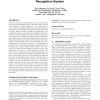Free Online Productivity Tools
i2Speak
i2Symbol
i2OCR
iTex2Img
iWeb2Print
iWeb2Shot
i2Type
iPdf2Split
iPdf2Merge
i2Bopomofo
i2Arabic
i2Style
i2Image
i2PDF
iLatex2Rtf
Sci2ools
CASES
2003
ACM
2003
ACM
A low-power accelerator for the SPHINX 3 speech recognition system
Accurate real-time speech recognition is not currently possible in the mobile embedded space where the need for natural voice interfaces is clearly important. The continuous nature of speech recognition coupled with an inherently large working set creates significant cache interference with other processes. Hence real-time recognition is problematic even on high-performance general-purpose platforms. This paper provides a detailed analysis of CMU’s latest speech recognizer (Sphinx 3.2), identifies three distinct processing phases, and quantifies the architectural requirements for each phase. Several optimizations are then described which expose parallelism and drastically reduce the bandwidth and power requirements for real-time recognition. A special-purpose accelerator for the dominant Gaussian probability phase is developed for a 0.25µ CMOS process which is then analyzed and compared with Sphinx’s measured energy and performance on a 0.13µ 2.4 GHz Pentium 4 system. The res...
| Added | 05 Jul 2010 |
| Updated | 05 Jul 2010 |
| Type | Conference |
| Year | 2003 |
| Where | CASES |
| Authors | Binu K. Mathew, Al Davis, Zhen Fang |
Comments (0)

